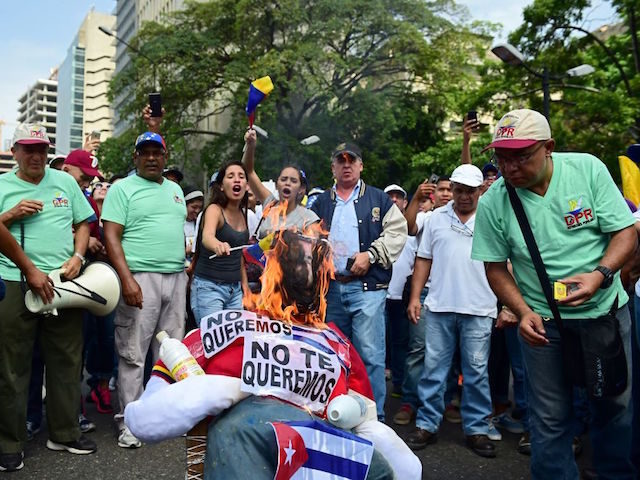Citizens across western Venezuela burned effigies of socialist dictator Nicolás Maduro and other prominent far-left figures on Monday evening to celebrate the turn of the New Year.
Photos published by Noticiero Digital show effigies of Maduro, Cuban communist leader Fidel Castro, workers at the state oil company, and members of the country’s corrupt electoral board burning, a way for citizens to express their despair at the worsening economic and humanitarian crisis that has devastated what was once one of Latin America’s richest and most developed nations.
Other designs also addressed many of the core issues faced by the crisis-stricken country, which include hyperinflation, scarcity of goods, a collapse in oil production, and the escalating migration crisis.
The tradition forms part of a 40-year-old Andean tradition known as “Quemas del año nuevo,” (New Year Burnings), where participants incinerate effigies in an attempt to leave behind negative emotions and events of the previous year. Typically, the dolls are blown up using fireworks, although their high cost means that most Venezuelans instead turned to the use of fire.
There is sadly little sign that any of the problems Venezuelans hope to “burn away” will disappear anytime soon, as Nicolás Maduro will soon begin another five-year term after successfully rigging last May’s presidential election, something he achieved banning all anti-socialist candidates from running.
Other problems such as inflation and migration are also only expected to get worse. The International Monetary Funding recently predicted that inflation in Venezuela will reach 10 million percent by the end of 2019, while a study last month by the Brookings Insitute estimated that 8.2 million people could leave the country within the next three years.
As noted by Miami’s WLRN station, there were many other reasons most Venezuelans had little celebrate as 2019 rolled in. Another one of their New Year traditions involves the eating of a dozen grapes as one makes a dozen wishes for the coming year. However, given that to buy a couple of pounds of grapes costs three times the monthly minimum wage, following this tradition will have proved a task too costly for most.
Follow Ben Kew on Facebook, Twitter at @ben_kew, or email him at bkew@breitbart.com.

COMMENTS
Please let us know if you're having issues with commenting.